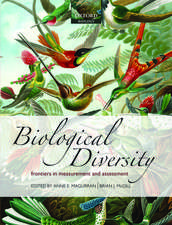Effects of Temperature on Ectothermic Organisms: Ecological Implications and Mechanisms of Compensation
Editat de Wolfgang Wieseren Limba Engleză Paperback – 9 dec 2011
Preț: 643.84 lei
Preț vechi: 757.46 lei
-15% Nou
Puncte Express: 966
Preț estimativ în valută:
123.20€ • 134.24$ • 103.81£
123.20€ • 134.24$ • 103.81£
Carte tipărită la comandă
Livrare economică 23 aprilie-07 mai
Preluare comenzi: 021 569.72.76
Specificații
ISBN-13: 9783642657054
ISBN-10: 3642657052
Pagini: 320
Ilustrații: XI, 300 p.
Dimensiuni: 170 x 244 x 17 mm
Greutate: 0.51 kg
Ediția:Softcover reprint of the original 1st ed. 1973
Editura: Springer Berlin, Heidelberg
Colecția Springer
Locul publicării:Berlin, Heidelberg, Germany
ISBN-10: 3642657052
Pagini: 320
Ilustrații: XI, 300 p.
Dimensiuni: 170 x 244 x 17 mm
Greutate: 0.51 kg
Ediția:Softcover reprint of the original 1st ed. 1973
Editura: Springer Berlin, Heidelberg
Colecția Springer
Locul publicării:Berlin, Heidelberg, Germany
Public țintă
ResearchDescriere
The study of thermoregulation in endotherms has contributed much to the emergence of the concept of control theory in biology. By the same token, the study of tempera ture adjustment in ectotherms is likely to have a far-reaching influence on ideas on the regulation of metabolism in general. The reason for this is that ectotherms, in adapting to the vagaries of a thermally unstable environment, deploy a range of subtle molecular and organismic strategies. Thus the experimenter, using temperature changes as a tool, is well equipped to analyze some of these strategies. This approach has enabled some important mechanisms of temperature-induced adaptation to be elucidated; the most striking of these are the effects on metabolism of changes in the conformation of enzymes and the transfer properties of membranes. Furthermore, there is a vague but persistent feeling among those working in this field that changes in the nervous system will ultimately prove to be the agency by which many of the molecular mechanisms of temperature adaptation are controlled. Should this indeed be the case, a new phase would soon begin in our understanding of the interactions between the systemic and the cellular levels of organization. However, it is not only questions about the causes of temperature adaptation that can provide answers of potential importance to the general biologist; of equal significance are questions as to the meaning of temperature adaptation in a particular organism.
Cuprins
Mechanisms.- Temperature Relations of Ectotherms: A Speculative Review.- Temperature Acclimation and Adaptive Changes in the Nervous System.- Neural Control of Temperature Adaptation in Rana temporaria.- The Influence of Temperature on Membrane Processes.- The Regulation of Cellular Function by Temperature-induced Alterations in Membrane Composition.- Basic Strategies and Mechanisms of Enzyme Adaptation to Temperature.- Acute Temperature Change and the Oxidation Rates of Ectotherm Mitochondria.- Effects of Acclimation Temperature on Aerobic Energy Production in Eel Liver: Oxidative Phosphorylation in Isolated Mitochondria.- Temperature-compensated Oxygen Consumption of Subcellular Preparations from Vertebrate Ectotherm, Endotherm, and Tumor Tissues.- Molecular Mechanisms of Temperature Adaptation in Arctic Ectotherms and Heterotherms.- Mechanisms of Insect Thermoregulation.- Ecology.- Environmental Factors Affecting the Acclimatory Responses of Ectotherms.- The Influence of Starvation on Temperature Relationships of Metabolism in Ectotherms.- Effect of Temperature on Active and Resting Metabolism in Polychaetes.- Some Effects of Temperature and Food on the Rate of Oxygen Consumption by Mytilus edulis L.- Temperature-dependent Storage Processes in Crayfish and Spiders.- Effects of Temperature on the Distribution of Turbellarian Triclads.- The Measurement of the Efficiency of Growth at Different Temperatures and Its Significance.- Life Table Data and Population Dynamics of the Rotifer Brachionus calyciflorus Pallas as Influenced by Periodically Oscillating Temperature.- The Role of Daily Temperature Rhythms in Brood Development of Ants of the Tribe Leptothoracini (Hymenoptera; Formicidae).- The Role of Temperature in Controlling Obligatory Diapause.- Cold Resistance.- Critical Minimum Temperatures of Reptiles.- Resistance Adaptations of Marine Invertebrates and Fish to Cold.- Ecological Aspects of Cold Resistance in Spiders (A Comparative Study).- Cold Resistance and Freezing in Arianta arbustorum L. (Pulmonata).














